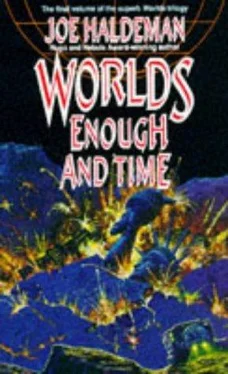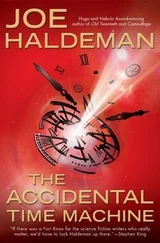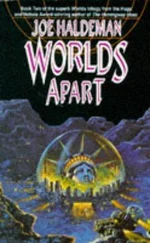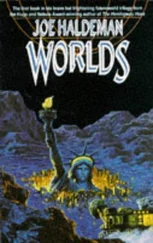It was less orderly than the original plan, people born in neat blocks of proper ages, with proper genetic combinations, the creche carefully preparing them to take over their proper roles in the colonization of Epsilon.
Instead, the creche system had been in chaos for a generation; not one child in four was raised conventionally. Some children were not even conceived conventionally, their parents having refused sterilization, reverting to the atavism of semihaphazard fertility. (There was still a measure of control, though. The amendment that allowed fertility also set a limit on the number of children per woman, adjustable according to the current demographic climate.) Most children lived with their parents most of the time, going to Creche a few hours a day for numbers and letters. Only about a tenth followed the traditional Crecheto-ageeight pattern.
There was a drastic shortage of teachers above the level of simple writing and computation skills, most of which were provided by computer instruction anyhow, the programs imported from Earth. From seventh form up, most of the teaching was catch-as-catch-can, done by professionals taking time off from their regular duties, who might or might not have any skill in communicating to young people.
O’Hara’s degrees in literature and music would oblige her to teach at least part time in those subjects. She looked forward to music, but wasn’t happy about the prospect of teaching literature—let alone trying to do it when most of the books she’d studied in school weren’t available. Her doctorates in American Studies and Management covered material too obscure or esoteric to be useful, and her practical experience in managing people was one skill that wasn’t rare.
They wanted to tap Charlee, too. She was a chemist, but was uncertain about how well she could teach it at the elementary level. She hadn’t put on a lab coat in twenty years. She could lecture for hours about arcane aspects of piezochemistry, but she wasn’t sure whether you were supposed to pour sulfuric acid into water, or vice versa. She did know that one or the other was liable to explode.
Age 55.05 [15 Columbus 427]—It’s a revealing way of dating a diary. So I’ve spent one thousandth of my life wandering through this interesting chaos. Well, hully gee, Mr. Crane. Time sure flies when you’re having fun.
First meeting of the Planetfall Consultant Pool was a circus. The latest bunch of Poolees, including Daniel, have only been out of the can for two days, still kind of disoriented. The first twenty or so are extremely impatient to get things moving. Charlee and I wander somewhere in the middle: will you please stop shouting? Will you please focus your eyes?
The Coordinators supplied us with a list of questions:
1. There are two shuttles plus one backup, each carrying thirty passengers and two crewmembers, and a tonne of supplies, or about three tonnes of supplies and no people. How many people should go down for the first, exploratory landing? How many flights?
My first response would be to send thirty brave, smart, but highly expendable people, along with a second shuttle full of tools and weapons. If they survive for a few weeks, we can send a larger, slightly less intrepid, bunch.
Kena Russel pointed out that all we know about the planet so far is that it’s a water/oxygen world of such-andsuch mass and diameter and average surface temperature. From orbit we’ll be able to tell what the terrain is like, whether there are large animals—or perhaps superhighways and immigration officials!—to contend with. Will we need lasers or linguistics texts? Passports? No way to know until we get there. All the advance planning is tentative.
2. The shuttles are presumably dangerous. They were designed to operate within an intricate maintenance pattern of testing and tweaking that we’ve only partly reconstructed. Estimates for “time till first failure” for each one go from ten flights to two hundred. Who goes on the early ones?
That’s just an inverted way of asking who is most expendable, of course. If anybody were truly indispensable because of what they know, they shouldn’t go near the shuttle in the first place, because ground and orbit will be in constant communication. No one has to be “on the spot” at all, in order to impart information.
Some people are important because of what they can do, though, rather than what they know, or in addition to that. Mechanics, carpenters, surveyors, equipment operators. The most intelligent and strong manual laborers. People with proven leadership skills and organizational ability—especially with planetside experience. That’s me. (Actually, there are quite a few of us, but I’m by far the youngest, at 55.05, or a spry 122, Epsilon years.)
3. Should anybody be asked to go against their will? To stay aboard?
To the first, I’d say absolutely not. It would be a nightmarish invasion of their rights and also impractical. You wouldn’t get any efficient work out of them, and they’d screw up morale.
I’d like to say no for the second one, too, but there’s a practical aspect to it. Suppose each shuttle fails on its tenth flight? Nine times 30 times 3 is 810 people. The last survey, combining cryptos and those of us among the warm, totaled eight thousand who want to go planetside and three thousand who want to stay aboard. A lot of people will have to wait. I suspect the numbers will become more manageable after the first shuttle wipeout, though.
(I wonder how the statistics will change once we start settlement. Some people undoubtedly will step out of the airlock, take one look at how far away the horizon is, and jump back into the shuttle. That happened to about one out of fifteen New New tourists who went to Earth, deepseated agoraphobia.
On the other hand, if the people working planetside are successful and happy, the more timid, but not agoraphobic, may change their minds.)
4. Should we concentrate on developing one site, or try several small settlements in different areas?
I was almost alone in opting for the latter. But then most of these people have lived in one biome all their lives (two, if you count subzero desiccation!) and don’t see any virtue in a variety of locations. I pointed out that some local danger might wipe out one place and not affect the rest—like Roanoke Island, the first British colony in America, which disappeared and left not a trace while its ship was on a resupply passage to Britain. Probably plague or a raid by autochthones. (French and Spanish settlements to the north and south were unaffected.)
Of course nothing so mysterious would happen to our pioneers. They’d have an audience.
It’s another one of those questions that’s not answerable until we see what the planet looks like. There may not be that much variety. Which leads to:
5. What do we do if Epsilon turns out to be uninhabitable?
Well, we could ram it out of spite. I didn’t suggest this.
Some of the scientists got huffy and said it was a nonquestion; if we hadn’t been sure that Epsilon was Earthlike, the mission wouldn’t have been launched. Son Van Duong pointed out that “Earthlike” circa spring 2085 would include a mutated virus wafting around that killed everybody within a few years. To the response “that was because of a war,” Son shrugged. So the war became part of the ecology.
The real question is, how much would we tell the people, how soon? Some before the others?
I think on general principles we ought to tell everybody everything, and just brace ourselves for a lot of unhappiness. A few thousand would probably be relieved, of course. (And what would the others do, leave?)
Читать дальше












